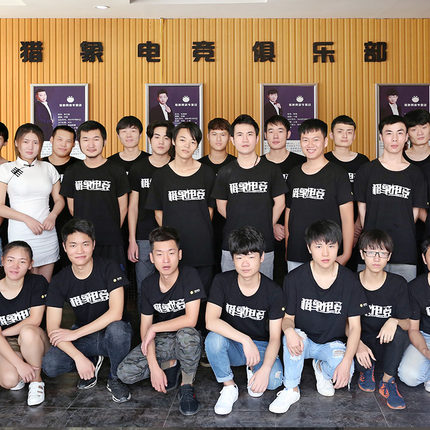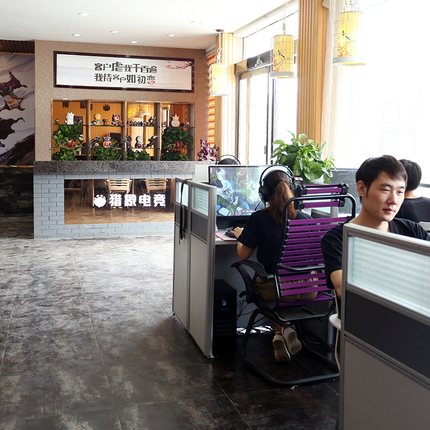Leveling up game accounts in China: a serious business and a headache for developers
- Transfer

If the game becomes quite popular, then players are likely to find ways to break its rules.
Some non-standard approaches to gameplay are harmless, while others destroy the gameplay as a whole. The most notorious example is the use of cheats - programs or scripts that give players an unfair advantage with the help of impossible functions in the game, for example, looking through walls or well-aimed shots from long distances.
Less well-known, but also very destructive is the boost (rating) for matching opponents (match making rating, MMR). During boosting, strong players participate in matches under other players' accounts in order to increase the in-game performance of these accounts. Like cheats, boosting itself has become an industry.
Boosting MMR is mainly found in multiplayer games, where high ratings serve as insignia and give players the opportunity to meet face-to-face with more experienced opponents. The most obvious example of such games is the multiplayer online battle arena (MOBA) genre. Boosting MMR, a problem that developers around the world are trying to fight unsuccessfully, has left a heavy imprint on the two most popular Tencent games: League of Legends and Honor of Kings.
Tencent has been struggling with cheats and MMR boosts for a long time, either suspending or bathing all accounts seen in their use, but recently the company has stepped up its efforts to eliminate such cases in its most profitable games. In addition to removing non-compliant accounts, the gaming giant released a new set of rules last month. It states that streamers are prohibited from distributing information about software and services that could violate the integrity of the company's games. As a result of constant purges, cheats and channels of their distribution were reduced to the dark corners of private groups in instant messengers. However, MMR booster services continue to thrive in full view.
Supply and demand
MMR leveling services, called dailian in Chinese , are available on platforms such as Dailiantong and Dailianmao. Customers, called boostees, can place orders on the platform for a certain rating increase, after which each order is given to a booster. All platforms claim to use “professional” boosters and offer customers a money back guarantee if the boosters fail to complete the order.
Similar services are also common on online shopping platforms such as Taobao and Tmall; stores boast of the quality of their services and send customers timely text notifications about the start and end of boosting. Some performers publish photos of rooms filled with boosters along with product descriptions; one store even advertises itself as the “pillar of the MMR boost industry,” on which the rest should be aligned.
China's MMR boost prices are platform dependent, but they are very competitive compared to what players would pay in countries like the USA. The MMR boost for League of Legends on non-Chinese servers from the lowest to the highest division costs $ 1,315 on Proboosting.net, while a similar upgrade on Dailianmao costs only 1,953 yuan (about $ 290).
Sales volumes on platforms are no less impressive. The Dailiantong platform claims that over the past five years it has accepted 30 million orders, which were completed by more than 500 thousand boosters. Between March 1 and 19 this year, the top four Tmall stores offering MMR boosts for League of Legends sold more than 6.7 million yuan in services.
Tencent reaction
Boosting MMR can do real money damage to game developers and publishers. Gaming analyst Tsui Chengy of IHS Markit, an information services company, said that while MMR boost is less damaging to games than cheats, it creates chaos. “Boosting MMR can affect aspects such as the diversity and user experience, and make it harder to attract new users to the game.”
In June 2018, Tencent issued an official statement explaining on its website about the game’s safety what League of Legends boost is and explaining penalties for such behavior: accounts that violate the rules for the first time will be suspended from the game for a week, violators for the second time will be suspended for a month with the cancellation of receiving the prize of the end of the season, and multiple violators will be banned forever. If a multiple intruder registers other accounts and continues to violate the rules, the company will consider the need for a hardware ban on his computer.
Then, Tencent periodically issued notifications listing the accounts that were banned monthly for boosting MMR. Since January 2019, the company increased the frequency of publishing applications from month to week and significantly increased the number of suspended accounts. For the whole of December there were only about 10 thousand suspensions, but in January the number grew to 25 thousand and continues to grow; in February, nearly 40 thousand accounts were suspended. A Tencent spokesperson linked the jump to the start of the new League of Legends game season.
Tencent does not disclose the technical details of the MMR boost detection process, but reports that it makes a decision based on a variety of factors, including user behavior patterns within the game and other players' complaints.
Tencent's crackdowns were mixed. The four best Tmall stores selling MMR boosts for League of Legends have received thousands of complaints about account suspension after purchasing their services. However, in most comments, boosters are praised for the quick execution of orders and without any penalties.

Player Opinions
Tencent pointed out three reasons for punishing League of Legends boosters and boosted players: harming the gameplay, devaluing other people's work, and jeopardizing the account’s security. The company’s statement of June 2018 explains that League of Legends selects opponents with a similar skill level to players; when a user plays under an account with a pumped MMR, he cannot cope and as a result becomes a burden for his team. However, some players reported that they are more annoyed by experienced boosters participating in low-level matches because they turn matches of players with equal skills into a one-sided “carnage”.
Although players generally have a negative attitude toward boosters, many use complaint reporting selectively. 21-year-old student Peng Ying from Nanjing University of Audit in East China's Jiangsu Province says she always complains about booster opponents because they "can easily take our top-line player." However, Peng admits that he does not send complaints to the boosters when they are on his team. "Usually they are much more experienced than us, this is a real value for the team."
Other players simply do not want to bother with sending complaints, saying that the game should not be taken so seriously. Fourth year student Qian Lingfeng from Southwestern Jiaotong University in Sichuan Province and an experienced League of Legends player told us that he never complains about boosters, even if they are obvious. “Boosters also need to live on something. You should not be very angry with them, ”he says.
Gray zone of law
Tencent never allowed the development and use of cheats. For example, players who are caught cheating on League of Legends immediately receive a three-year suspension of their accounts. According to information from the game security website , in 2017, Tencent collaborated with the police to arrest more than 120 suspects involved in the development and distribution of cheats for the company's games. In 2018, the number of arrested suspects rose to more than 300, their income amounted to about 151 million yuan.
Unlike the harassment of cheaters and cheat developers, Tencent does not take any serious measures to terminate the MMR boost, with the exception of suspension of violators' accounts. She does not touch either the company or the platform providing such services. According to lawyers, this situation has arisen because the development and distribution of cheats is illegal, while the degree of legality of the MMR boost is still unclear.
“Cheats are malicious code, and their developers disrupt the operation of computer information systems, which is a criminal offense. They also illegally break into computer information systems to obtain data, which violates the seventh amendment of the PRC Criminal Code, ”lawyer Zou Yi from the Denton Law office in Nanjing told us.
In addition to these two crimes, creators and distributors of cheats may also be charged with illegal business activities and copyright infringement, lawyer He Jing from Beijing branch of Merits & Tree Law Offices told us.
Boosting regulation for MMR and similar services has been introduced, for example, in South Korea, but is not yet available in China. Without clear legislation, game developers and publishers in practice may restrict these services only on the basis of the terms of the user agreement.

Lawyers are still arguing about the legality of the MMR boost, and, according to He, the experts are leaning in both directions. One side says that the services are legal, because both boosters and pumped players enter into a service agreement that does not prejudice a third party. From this point of view, publishers can punish violators by suspending their accounts, but do not have the right to take legal action.
The arguments of the opposite side are similar to the arguments of Tencent. She claims that MMR boosting harms the gaming environment, rules and balance, which can lead to a decrease in the number of players and a decrease in the life of the games. Boosting violates the normal state of the market and competition, damages the income and interests of game publishers, that is, violates laws on unfair competition.
Potentially, a lawsuit can determine the priority of one of the points of view, but so far no such lawsuit has been made. “At the moment, no game developer or publisher has filed a lawsuit against providers of MMR boosting services to violate laws against unfair competition,” he says. “And since there were no lawsuits, the judiciary cannot decide on this issue.”
Tencent did not directly answer the question of whether it intends to use legal measures to reduce the number of providers of MMR boosting services, but its representative said that the company reserves the right to “hold accountable those who threaten the security of the game and illegally receive income ".
